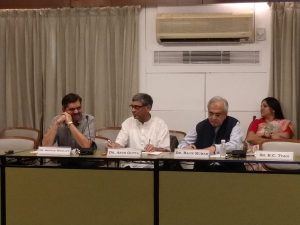Conflict of Interest in Public Policy: Stakeholders demand new law
In a roundtable conference against curbing corruption, stakeholders took stock of the rising number of Conflict of Interest cases and raised their voices on the need to make disclosure of such vested interests mandatory under law.
 C handa Kochhar, Nachiket More, FSSAI and many such individuals and organisations were the prominent examples discussed at the ‘Conflict of Interest in Public Policy: the Roundtable Conference’ at the India International Centre, recently.
C handa Kochhar, Nachiket More, FSSAI and many such individuals and organisations were the prominent examples discussed at the ‘Conflict of Interest in Public Policy: the Roundtable Conference’ at the India International Centre, recently.
Organised by the Swadeshi Jagran Manch (SJM) and Breastfeeding Promotion Network of India (BPNI), the stakeholders including doctors, academicians, activists and public policy experts raised concerns about rising cases of Conflict of Interests (CoI) while stating that a law can be one of the ways to begin with for identifying and managing CoI, and thereby corruption.
“We are not against names but we want to create awareness about the possible ramifications on the country’s sectors,” opined Ashwani Mahajan, National Co-Convener of SJM, while mentioning that raising CoI issues is not being anti-industry or anti-corporate but stems from situations that lead to vested interests.
To curb corruption in the country, prevention and management of CoI in public policy and programmes can become a game changer, Mahajan held. “Therefore, it’s important to start a dialogue about this crucial issue in the public domain in public interest,” he said.
“Though a Bill was introduced in the Parliament as a Private Member’s Bill ((The Prevention and Management of Conflict of Interest Bill, introduced in 2012), it has not been passed. We definitely need a guideline in law to address this problem. Since there is no law, everyone says that there is no CoI, which is not true. Once there is a law, it can be one of the first steps to initiate dialogue on various issues,” Mahajan told Delhi Post.
CoI are considered situations where politicians, public servants, consultants, technical/scientific experts, subject matter specialists or academicians have an actual or potential interest (usually financial) that may influence or appear to influence the conduct of their official duties or the quality of advice or recommendations rendered by them.
In the context of decision-making by the government bodies and institutions for public good, CoI becomes even more critical in situations where the corporate or private sector or their lobbyists are involved.
“ There is no need to take nuanced examples because all sides or sectors in the society are filled with CoI which means national or public interest becomes secondary. So a law is mandatory. However, despite laws such as The Dowry Prohibition Act, it is still prevalent. Only a legalistic route is not helpful. What is needed is a ‘Jan Andolan’ or people’s movement,” said Dr. Rajiv Kumar, Vice Chairman of Niti Aayog, which is the policy think tank of the Government of India.
Dr. Kumar also stated that COI by definitions need to be relooked and re-analysed because not all connection between the public sector and the private sector can be seen as “wrong”. “One needs to see if it is about constructive coalition building in national interest versus COI,” he stated.
“CoI can be institutional or personal and with the growing abundance of Public-Private Partnerships (PPPs) in the public policy sector, especially noted in the health and nutrition policies, involve complex relationships among the government actors and ‘interested’ partners. Such situations of CoI can have a negative impact on public health.”
 Public health physician, Dr. Mira Shiva, Director, Initiative for Health Equity and Society, and Founder Coordinator of All India Drug Action Network, told Delhi Post, “CoI is much more in the health field where so-called medical experts and their research studies which are sponsored by the companies become the basis of policies. And the people involved in that are actually in the payroll of the company. So, whether it is recommendation for malnutrition, under-nutrition or for any disease, it plays out in different ways.”
Public health physician, Dr. Mira Shiva, Director, Initiative for Health Equity and Society, and Founder Coordinator of All India Drug Action Network, told Delhi Post, “CoI is much more in the health field where so-called medical experts and their research studies which are sponsored by the companies become the basis of policies. And the people involved in that are actually in the payroll of the company. So, whether it is recommendation for malnutrition, under-nutrition or for any disease, it plays out in different ways.”
Noting that without a movement from the Government representatives and people, awareness regarding CoI will not be created, Dr. Arun Gupta, Central Coordinator, BPNI told Delhi Post, “By definition, CoI pertains to how decisions are made and in whose interest. The lack of awareness regarding CoI is due to lack of interest from political parties and Government. And at the same time, it is owing to the perception that it is anti-industry. So there is a lot of power behind CoI across sectors. If there is a movement from the Government or oath of Constitution is invoked, then people will start thinking at a higher level which will have a trickle-down effect as well.”
“Along with a legal framework, the stakeholders recommended Government of India and State governments should issue a notification for declaration of interests by all participants in all official meetings/related bodies/expert committees etc and Government of India should issue guidelines on identifying and managing such CoI.”
It also recommended that formulation and implementation of tools for identifying and managing CoI in public policy/programmes could include those suggested by Organisation for Economic Co-operation and Development (OECD) toolkit (by mapping “at risk” areas and positions within the public service), and World Health Organisation’s Framework Convention on Tobacco Control.
The roundtable invoked the Constitution of India which provides for oath under Article 246, Schedule 7-List III of Concurrent List item 12, the Rajya Sabha’s Department-related Standing Committee on Personnel, Public Grievances, Law and Justice and the recommendation of the Government of India in its 69th Report which stated that CoI should be included under bribery (15 A). It also recalled that in July 2014, Prime Minister Narendra Modi also called for a law on CoI under a 17-point Agenda.
Securities and Exchange Board of India (SEBI) Member, Vijay Sardana, told Delhi Post that an incorrect or inaccurate declaration should be “liable for criminal offence”. “From Panchayat to the Prime Minister’s level, such declaration is indeed possible. Once declaration is signed, then the onus falls on the individual. It is like being witness to your own crime.”
